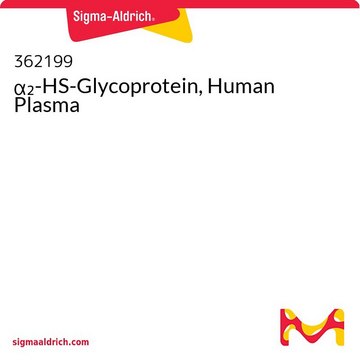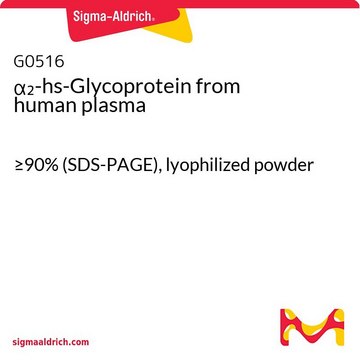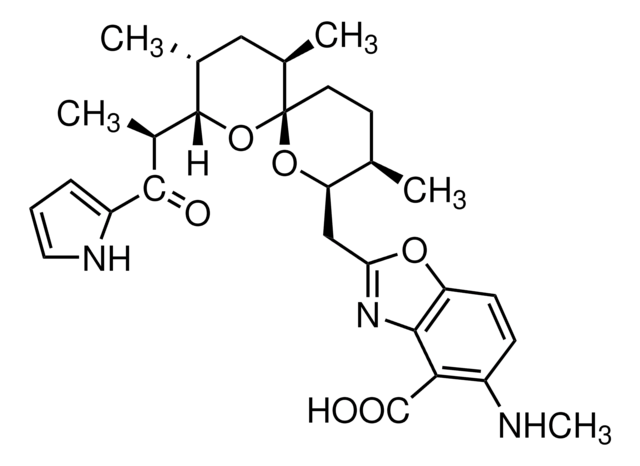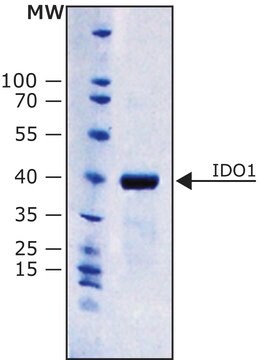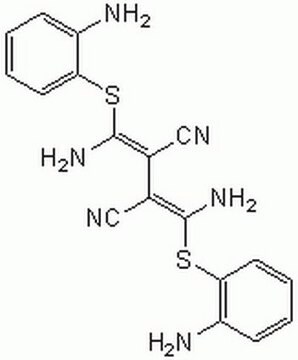SRP3284
GASP-1 human
recombinant, expressed in CHO cells, ≥95% (SDS-PAGE), ≥95% (HPLC)
Synonym(s):
GDF-associated serum protein-1
Sign Into View Organizational & Contract Pricing
All Photos(1)
About This Item
UNSPSC Code:
12352200
NACRES:
NA.32
Recommended Products
biological source
human
recombinant
expressed in CHO cells
Assay
≥95% (HPLC)
≥95% (SDS-PAGE)
form
lyophilized
mol wt
55.0-66.0 kDa
packaging
pkg of 25 μg
concentration
0.0025-0.0040 μg/mL
impurities
<0.1 EU/μg endotoxin, tested
color
white to off-white
UniProt accession no.
shipped in
wet ice
storage temp.
−20°C
Gene Information
human ... WFIKKN2(124857)
General description
Growth and differentiation factor-associated serum protein-1 (GASP-1) is expressed primarily in the ovary, testis, and brain. The GASP-1 gene encodes a 571 amino acid protein that contains a 29 amino acid secretion signal sequence, and multiple identifiable structural features, including a WAP domain, a follistatin/Kazal domain, an immunoglobulin domain, two tandem Kunitz domains, and a netrin domain. Recombinant human GASP-1 is a 542 amino acid protein that migrates at an apparent molecular weight of approximately 55-66kDa by SDS-PAGE analysis under non-reducing conditions.
Biochem/physiol Actions
Growth and differentiation factor-associated serum protein-1 (GASP-1) is a secreted inhibitory TGF-β binding protein that contains multiple protease inhibitor structural domains. It can act as a potent soluble inhibitor of myostatin and GDF-11, but not Activin-A.
Physical form
Lyophilized from 10 mM Sodium Phosphate, pH 7.8.
Reconstitution
Centrifuge the vial prior to opening. Reconstitute in water to a concentration of 0.1-1.0 mg/mL. Do not vortex. This solution can be stored at 2-8°C for up to 1 week. For extended storage, it is recommended to further dilute in a buffer containing a carrier protein (example 0.1% BSA) and store in working aliquots at -20°C to -80°C.
Storage Class Code
10 - Combustible liquids
WGK
WGK 3
Flash Point(F)
Not applicable
Flash Point(C)
Not applicable
Choose from one of the most recent versions:
Certificates of Analysis (COA)
Lot/Batch Number
Don't see the Right Version?
If you require a particular version, you can look up a specific certificate by the Lot or Batch number.
Already Own This Product?
Find documentation for the products that you have recently purchased in the Document Library.
Extracellular Regulation of Myostatin: A Molecular Rheostat for Muscle Mass
Se-Jin Lee
Immunology, Endocrine & Metabolic Agents in Medicinal Chemistry, 10, 183-194 (2011)
GASP/WFIKKN Proteins: Evolutionary Aspects of Their Functions
Olivier Monestier
PLoS ONE, 7(8), e43710-e43710 (2012)
Jennifer J Hill et al.
Molecular endocrinology (Baltimore, Md.), 17(6), 1144-1154 (2003-02-22)
Myostatin, a member of the TGFbeta superfamily, is a potent and specific negative regulator of skeletal muscle mass. In serum, myostatin circulates as part of a latent complex containing myostatin propeptide and/or follistatin-related gene (FLRG). Here, we report the identification
Our team of scientists has experience in all areas of research including Life Science, Material Science, Chemical Synthesis, Chromatography, Analytical and many others.
Contact Technical Service